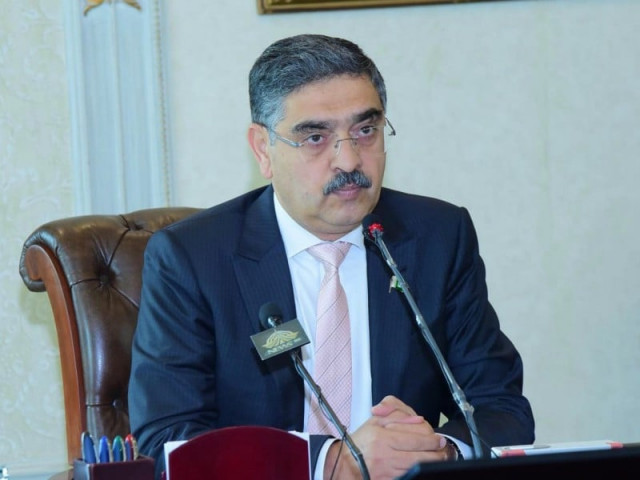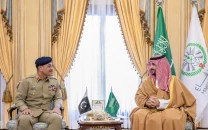PM seeks to tame high inflation with fuel price cuts
Kakar directs authorities to activate strict price control mechanism

Caretaker Prime Minister Anwaarul Haq Kakar on Monday said the government is looking to tame inflation with fuel price cuts and a price-control mechanism.
Pakistan is embarking on a tricky path to economic recovery under a caretaker government after a $3 billion loan programme approved by the International Monetary Fund in July averted a sovereign debt default, but with conditions that complicated efforts to control inflation.
"Consequent to substantial reduction in fuel prices, I have directed the concerned authorities at federal and provincial levels to activate a strict price control mechanism," Kakar said in a post on X.
Consequent to substantial reduction in fuel prices, I have directed the concerned authorities at Federal and Provincial level to activate a strict price control mechanism. I urge all honorable Chief Ministers to ensure that prices of essential commodities and services are reduced…
— Anwaar ul Haq Kakar (@anwaar_kakar) October 16, 2023
He added that efforts should be maintained in transferring the benefit of the cut on prices of commodities.
Effective Monday, the price of petrol dropped by Rs40 to Rs283.38 a litre, while high-speed diesel cost fell by Rs15 to Rs303.18 a litre, as per the finance ministry.
The ministry cited the decreasing trend of petroleum prices in the international market and the appreciation of the rupee against the US dollar as reasons for the cut.
The inflation rate rose to 31.4% year-on-year in September from 27.4% in August, primarily due to high fuel and energy prices.
The rupee hit all-time lows in August before recovering in September to become the best-performing currency following a clampdown by authorities on unregulated forex trade.
Analysts, however, expect the fuel price cut to be short-lived and ineffective at taming inflation.
Read more: Common man finally gets some relief
"The current cut in fuel prices has been led by a lower ex-refinery price, which is a function of international prices and the rupee parity. The sustainability of this cut is subject to future movements in these factors,” Amreen Soorani, Head of Research at JS Global Capital, said.
She added that the crackdown in illicit trade had been a key factor in the appreciating rupee against the dollar and that continued efforts on the same path would likely keep the rupee trend stable.
"Pakistan is a trade-deficit country with limited dollar inflow avenues in its balance of payments. In the longer term, present information suggests the rupee would likely continue a depreciating trend, albeit, ongoing efforts may limit the quantum of depreciation," she added.
Fahad Rauf, Head of Research at Ismail Iqbal Securities, pointed out the downward sticky nature of prices. "When the fuel prices go up, the transportation cost and product prices also rise, but when the prices fall, the impact is not passed on to consumers to the same extent," Rauf added.
The war between Hamas and Israel poses one of the most significant geopolitical risks to oil markets since Russia's invasion of Ukraine last year, analysts say. "...we believe the oil price warrants a risk premium of USD5-10/bbl, due to the supply risk," ANZ research said in a note on Monday.
Also read: Inflation surges to 28.3% in July
Separately, in his article published in Global Times China, interim PM Kakar expressed the country's commitment to jointly building the China-Pakistan Economic Corridor (CPEC), saying the project has transformed the socio-economic landscape of Pakistan.
"The CPEC has transformed the socio-economic landscape of Pakistan, upgrading modern infrastructure, enhancing regional connectivity, ensuring energy security, and creating jobs," the prime minister wrote in his article as he is set to participate in the Third Belt and Road Forum for International Cooperation in China on Oct 17-18.
The forum marks the completion of a decade of the Belt and Road Initiative (BRI).
Kakar said Pakistan endorses China's vision of CPEC as a corridor of growth.
As the flagship project of the BRI, he said, CPEC marks a milestone in Pakistan-China relations by placing "economic cooperation and connectivity at the very center of the bilateral agenda", making the two countries more interconnected.
"We fully endorse China's proposal of developing the CPEC as a corridor of growth, livelihood, innovation, greenness, and openness - representing our two countries' preference for a human-centric approach, inclusivity, and green development," he said.



















COMMENTS
Comments are moderated and generally will be posted if they are on-topic and not abusive.
For more information, please see our Comments FAQ